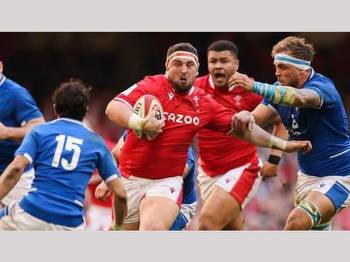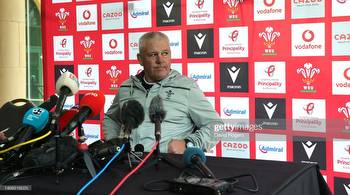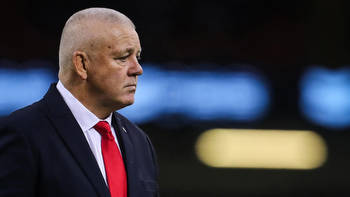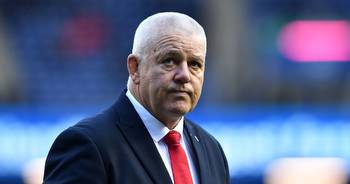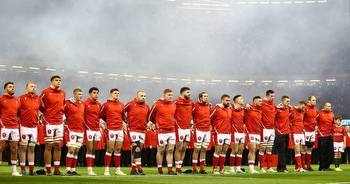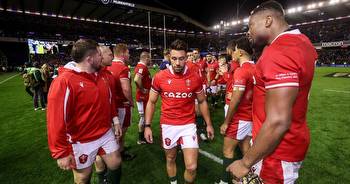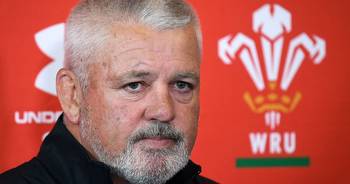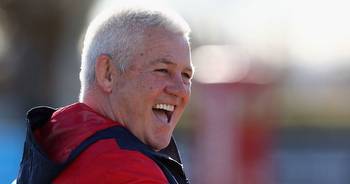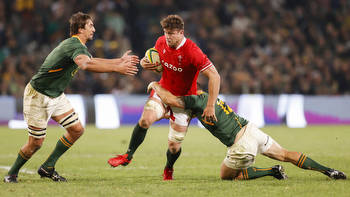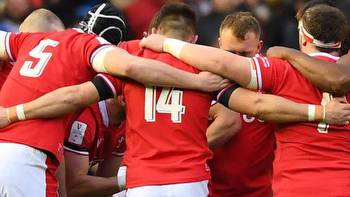The full details of Welsh rugby players' new contracts and the issue that really threatens Wales v England
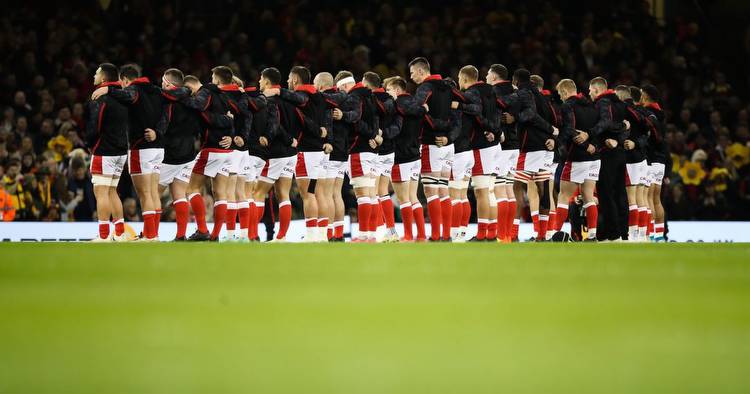
The stand-off between Welsh players and rugby bosses over contracts that has raised the possibility of strike action for Wales v England in the Six Nations this weekend has largely hinged on three demands.
It would appear that two of them — getting rid of the 60-cap rule and giving the Welsh Rugby Players' Association a voice on the Professional Rugby Board, which runs the pro game in Wales — could happen in the coming days.
However, the final demand — to review the fixed-variable contracts that would see only 80% of players' wages guaranteed — seems to be one that Welsh rugby bosses are not willing to budge on. Without any form of concession on that front, the probability of strike action remains very real.
So what do these new standard contracts actually involve? Why are players so concerned about them? And why are Welsh rugby bosses insistent they are the right path forward? We take a look:
What do the new contracts look like?
Well, let's start with exploring exactly what they are. The continued inability to thrash out and sign off on a new six-year financial framework has left Welsh rugby in a state of complete financial uncertainty. The four professional sides have been unable to offer new deals to players mere months before players are out of contract.
However, moving forward, salaries are expected to drop significantly in the coming years. Next year's budgets are expected to be in the region of £5.2million per region to honour existing contracts, before a salary cap of around £4.5m the following year - something the PRB say is in line with competitors.
As part of the negotiations for the new six-year funding model, the WRU and the regions had been working together to agree on a standardised contract structure across all four regions. The key sticking point is that the contract structure will incorporate both fixed and variable elements.
In basic terms, it means that all players who are offered new agreements in Wales from now on will be handed a deal where 80% of their salary is guaranteed, with the remaining 20% being made up of bonuses.
In England, the average wage of an elite men's player is £160,000, while in Wales that is expected to be around £100,000 next season, with the maximum basic wage being £278,000.
Previously, the highest wage on offer in Wales had been around £400,000. Those figures, which the PRB slammed as being too high in a statement last week, ultimately came from the WRU setting the top level of wages as part of the National Squad 38, which was a group of home-based Wales internationals whereby 80% of a player's salary was paid by the WRU and the remaining 20% by a region.
But in the new contract format, players would be banded into five tiers. WalesOnline understands those tiers are broken down into the following salary brackets:
- £30,000-50,000
- £50,000-80,000
- £80,000-150,000
- £150,000-250,000
- £250,000-400,000
In terms of the tiers, the likelihood of reaching the top end of each one is is understood to be difficult, due to the variable nature of bonuses. For example, with the highest base salary being £278,000, it is only with the full amount of bonuses and international fees available which would bring it up to £400,000.
It is also understood that regions can have up to nine players in each tier, but it is unclear what that would mean for a side that currently might have a high number of players in one bracket. Currently, the Ospreys have a high number of Wales call-ups so there's a decent chance they would have a large quantity of players in the higher brackets. But if they had more than nine in any individual tier, would they have to reassess the value of individual players or simply let talent go?
What about the bonuses and clauses?
The bonuses will be made up of things like fees for winning matches, making appearances and even starting games.
Crucially, because those bonuses account for 20% of the overall wage, they would be capped at a certain point. So if a player was earning £40,000 a year, then the maximum amount of bonuses he would be able to earn would be £8,000. A player on that salary would likely be expecting a bonus of £400 each for either a win, an appearance or a start. A player earning £80,000 a year would see their bonuses capped at £16,000: starts would likely be worth £444, appearances £178 and £889 for wins.
It's worth noting a player wouldn't get both a starting fee and an appearance fee for the same match, the appearance fee is there for replacements and isn't present in every contract. Also, the top two salary tiers of £150,000-250,000 and £250,000-400,000 only have bonuses for wins and starts. For the highest tier, a player would get around £1,992 for starting and £3,985 for winning matches.
There had been other clauses within the contracts which had caused consternation. A capability clause, something present in the Scarlets' current contracts, meant contracts of players deemed to be underperforming could be reviewed and even terminated, but that element was removed after a backlash last week.
The other area of concern was players being loaned between Welsh clubs without their consent. Were a player to be loaned to an English club, it is understood consent would be needed by the player. The original structure proposed meant that would not be the case for loan deals within Wales. Many players' fear was they could be forcibly moved around in order for clubs to operate below the salary cap as belts tighten. However, it would again seem concessions have been made on this, although it is still unclear just how much.
One other point beyond the contracts is, as part of the new regional model, that a region could be fined by the WRU if they let someone who is in Warren Gatland’s player of national interest group, which can contain as many as 60 Welsh players, move on. According to the new regional model, the four regions have to ensure that "reasonable endeavours" have been made to retain the services of those players.
Prioritising contracts for players who are not Wales-qualified over Welsh players does not count as "reasonable endeavours" and any release fee for players heading outside of Wales would result in a pound-for-pound reduction in funding from the union.
Currently, there are players of interest to the national team in contract who all have offers to go. Tomas Francis, Liam Williams and Josh Adams have all been linked with moves away from Welsh rugby in recent weeks. While all quality internationals, it could be argued that their salaries could go towards the regions keeping multiple other players. In that case, moves away might be to the benefit of both club and player.
However, WalesOnline understands that, as players of national interest, the WRU can block their moves and currently intend to do so with those three players. All three have been told they must honour their contracts despite the fact the regions could struggle to honour their contracts moving forward.
Why are players unhappy?
So that's the financial side of things done. What exactly do the players not like about the deal?
It would be easy for some to paint this as players being unhappy about money, but those at the heart of it have consistently maintained that is not the case. Players feel they have been caught in the middle once again, being blamed for taking too much money while those above them in the food chain squabble over what is and isn't available.
In reality, it is the uncertainty of players' futures that is the biggest issue, with more than 70 players unsure of whether they have a job in a few months.
WalesOnline understands the WRU and one of the professional sides made a big play to retain the services of an international player before Christmas. However that player, who is out of contract at the end of the season, has since suffered an injury, and no further contract offer has been made despite the fact his deal runs out in a matter of months.
Another player has expressed their doubts to WalesOnline over how long Wales will have four professional sides, while we have been told of a current Wales international questioning how much longer they would be willing to carry on playing on for Wales, such is the sorry situation within the game.
There has also been a lack of consultation from the WRU with the players. We understand the WRPA proposed a delay in a new deal to the WRU around a month ago so players could be properly consulted rather than rush something through. However, it's understood the union turned down that offer, with one player saying it was "to try and get players who are panicking about their futures to sign a deal that was extremely favourable to them", adding it was "morally wrong".
For many, the issue isn't as complex as some believe it to be. If there truly isn't enough money to go around in Welsh rugby, all the players are asking is why they are the only ones feeling the pinch? As one player told WalesOnline last week: "There's no mention that coaches or senior executives will be taking cuts so how are we all working together in this?"
Maybe if others in Welsh rugby were being asked to bite the bullet, the pill would be less hard to swallow. That is why the terms of the proposed contracts have caused such consternation.
Obviously some things, like the capability clause and the forced loan moves before their amendments, are just obvious as to why there's a backlash. As for the bonuses, players just don't see that 20% of their already reduced income as being realistically achievable.
In a week which has seen players threaten strike action amid tales of players struggling to secure mortgages and needing antidepressants to cope with the stress, the realities of rugby as an attritional and unpredictable career are only too easily highlighted. Bonuses will do little to ease those fears, with many players finding them frankly insulting amid the ongoing uncertainty.
If we go back to that player earning a basic salary of £80,000, the most he can earn is £96,000, when, according to sources, some players being offered that deal could easily earn £110,000 elsewhere. But to earn the full amount of £96,000 would require a lot. For example, were he to start 12 matches, make appearances in another eight and win 10 of those, he would have £15,642. And those numbers are frankly generous given the cuts Welsh rugby is facing.
WalesOnline has been told of the regions holding meetings in which players were told the next three to five years would essentially be seen simply as survival mode. Reduced budgets will result in smaller squads as well, with squads expected to consist of around 33-36 players moving forward.
While the new regional deal promises more players will be released from Wales' Six Nations and autumn camps than the zero who headed back during the Six Nations fallow period last weekend — with the proposed heads of terms referring to 28 fit players staying with Wales and the remaining squad going back to their clubs — such a small regional squad could easily see teams leaning heavily upon academy products moving forward.
All of a sudden, the win bonus function seems relatively flawed.
The same goes for the lack of an appearance fee within the top two tiers of the contract structure. Let's imagine there are two players at a region, both on the highest band and playing in the same position. Were one to start but go off injured after a matter of minutes, with the other replacing him and playing the remaining 70-odd minutes, it would be the one who played just 10 or so minutes who could be awarded the starting fee, which in this case would be £2,000.
Speaking about the bonuses on offer, one player within the Welsh game told WalesOnline it was a "total shambles" as they bemoaned the arrogance of those in charge of the game.
Why are Welsh rugby bosses so insistent on these new contracts?
Despite the concerns of players which have brought us to the brink of a strike ahead of the biggest game in Welsh rugby's calendar, this doesn't seem to be one area that Welsh rugby bosses are willing to concede ground on.
Last week, a statement from the PRB claimed there was "no room for manoeuvre when it comes to the overall budget available for player contracts", while its chair Malcolm Wall remained insistent the fixed-variable element was the best way forward.
It begs the question why that is the proposed deal of choice? Well, it all stems from the simple fact that Welsh rugby is financially unsustainable as it currently stands.
The constant threat of losing at least one region has been an albatross around Welsh rugby's neck for years now, but it seems to be creeping into the territory of inevitability.
Financially, the regions have been hindered by not only a lack of investment, but also by being forced to carry much of the burden and risk over the years, such as the repayment of the £20m CBILS loan during Covid which was taken out as a result of the WRU not paying for player access in 2020. That loan in particular summed up the general consensus that the regions aren't being compensated for access to national team players.
The regions would argue that they are not getting value for money from their players, especially their internationals. Again, it's worth noting the argument that once the WRU set the wages for the highest earners in the game, the Welsh game lost control of player salaries.
For the regions, they see this as a rebalancing act, with a better footing needed between players' international and regional priorities. Some might even see it as the case that players perhaps don't feature as much directly before and after international camps as regions would like.
Of course, the argument could be made if the WRU paid the regions the market rate for access to players, the regions wouldn't have to pass on these reduced contracts to players. That's just the nature of Welsh rugby and its financial viability, though.
But while the two sides are at such odds over these contract structures, the probability of strike action this weekend only looms larger.
"I think there will be a strike," one player told WalesOnline. "I can’t see the union budging and the union will think the players will cave."


